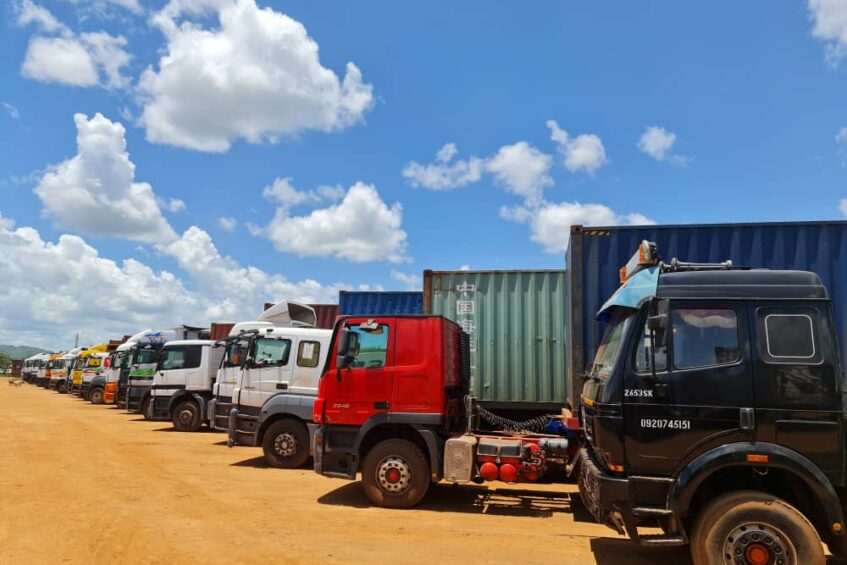
Trucks at the Nimule Customs yard | Credit | Deng Daniel
Uganda is reportedly set to destroy tons of locally produced maize consignments previously impounded by South Sudan authorities, after a new independent test carried out by regional experts came out positive for an above-normal level of the aflatoxin chemical.
The East Africa Community Standard experts carried out the fresh test that confirmed the result announced by South Sudan Bureau of Standard in May, according to top selling local newspaper, Daily Monitor.
Preliminary lab results reportedly show that 1700 tons of maize product valued at 2 million U.S. dollars have now exceeded the normal quantity of the chemical that is scientifically proven to cause cancer.
“The maize failed to pass the EAC agreed permissible limit for Aflatoxin B1 in the EAC economic bloc,” says Uganda Millers Association Coordinator Jacob Kabondo, according to Monitor.
In mid-October, a diplomat in Kampala said Ugandan traders have resumed exporting their maize to South Sudan after halting supplies for over three months due to the measures taken to address food safety concerns, but which escalated into an uneasy trade row.
South Sudan’s Ambassador to Uganda Simon Juach Deng said the trade resumption follows an agreement between the Bureau of Standards of both countries to normalize the sale of Uganda maize to South Sudan on condition that Kampala places strict regulations on the quality of its exports.
In May 2023, South Sudan Bureau of Standards impounded 62 Uganda trucks loaded with maize grains after a lab test found the items contained dangerous chemicals.
A South Sudanese clearance official at the Nimule border point said samples from the shipment were confirmed with high aflatoxin after the grains were subjected to several laboratory tests by the South Sudan National Bureau of Standards.
Aflatoxin is a naturally occurring toxin produced by certain mold species that can contaminate crops and pose health risks to humans and animals if consumed.
In February 2023, Ugandan food scientists found that maize, sorghum and groundnuts produced locally pose a cancer risk.
Meanwhile, Ambassador Juach said last week the situation resulted from the practice of buying from unregistered producers.
“It was also found that some of these people were really not buying from registered grain producers they were just picking from the markets so it was resolved that, before this grain cross into South Sudan the Uganda Bureau of Standard will have to certify them that they passed the quality, and therefore will have no problem, that has the agreement and since then nothing has been happening.”
Imports-dependent South Sudan is geographically a landlocked country heavily relying on Uganda goods and imports through the Kenyan Port of Mombasa, which must also enter through Uganda.
Support Eye Radio, the first independent radio broadcaster of news, information & entertainment in South Sudan.
Make a monthly or a one off contribution.
Copyright 2024. All rights reserved. Eye Radio is a product of Eye Media Limited.